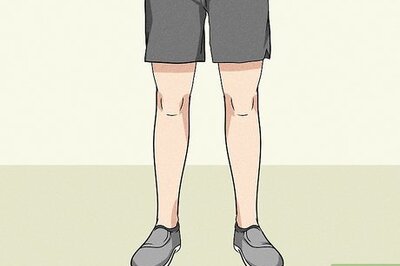
views
LONDON: Britain has set a target of having offered the first shots of a COVID-19 vaccine to 15 million people in its highest priority cohorts by mid-February.
Every adult in the country will be offered a vaccine by autumn, Health Secretary Matt Hancock said.
The easing of tough lockdown measures imposed to tackle a surge in the virus will depend in large part on the speed of the vaccine rollout.
Below are some details on how the effort is going.
HOW MANY PEOPLE HAVE BEEN VACCINATED?
Hancock said on Sunday about 2 million people had already received a vaccine dose, including one third of all the over-80s. Around 200,000 shots are being delivered a day.
The government will publish daily figures from Monday.
Another step up in the scale of vaccination will be needed in the coming weeks to hit the government’s target. About 2 million shots a week will be required.
WHAT’S THE TARGET?
Prime Minister Boris Johnson wants the top four priority groups to have been offered a dose of a COVID-19 vaccine by mid-February.
Those groups are, in order:
1. residents in a care home for older adults and their carers
2. all those 80 years of age and over and frontline health and social care workers
3. all those 75 years of age and over
4. all those 70 years of age and over and clinically extremely vulnerable individuals.
The first two priority groups have both been receiving vaccine in the initial stages of the rollout.
Initially government ministers gave a range of between 13 million-14 million people as falling into these categories. On Thursday, Johnson said there were 15 million people covered by the target.
Hancock said on Thursday the government used the term “offered” because people had the right to refuse the shots, but said the phrasing would not be used to fudge the target by, for instance, writing letters to people without a firm prospect that they would receive the shots.
To meet the target, all the people in the cohorts will have had to have received their first doses of vaccine, he said, unless they refused the vaccine.
WHERE WILL THEY BE DELIVERED?
Seven mass vaccination centres – in conference venues, a soccer stadium, and a racecourse – will start delivering vaccinations on Monday.
More sites in hospitals, doctors surgeries and the first in pharmacies will also open this week, taking the total to about 1,200 in England.
WHICH SHOTS?
Britain is rolling out two vaccines.
One, developed by Pfizer and BioNTech, has been distributed since Dec 8, accounting for most vaccinations so far. Britain has ordered 40 million of the shots.
A vaccine which uses mRNA technology, it must be stored at ultra-low temperatures, though it can be kept in a fridge for five days.
The rollout of Oxford/AstraZeneca’s chimp-adenovirus vector vaccine began on Jan 4. Britain has ordered 100 million of the shots, which have less onerous logistical conditions than the Pfizer one and will form an increasing part of the rollout.
Britain’s medical regulator also approved Moderna’s vaccine for use on Friday, but delivery is not expected until spring.
In all, Britain has ordered seven different types of vaccine, totalling 367 million doses.
DOSING
Pfizer and AstraZeneca’s shots are both two dose vaccines. However, on Dec. 30, Britain changed its guidance on when the second shot has to be given, saying it can be given up to 12 weeks after the first shot.
Ministers and medical officials say the move will save lives by giving some protection to more people. The chief medical officer said the balance of risk supports the move on a public health grounds.
However, some scientists have queried rolling out the vaccines on a dose regime that differs to the trial setting.
While AstraZeneca’s shot was tested with different intervals between doses, Pfizer has said there is no data to demonstrate the efficacy of its first dose after 21 days.
The head of the health service said that 12 days after the first dose of the Pfizer vaccine, a person might have 90% of its benefit.
Some people have received second doses as recently as Friday, 10 days after the guidance change. In the week to Jan. 3, 21,000 people had received a second dose of the vaccine, the government’s coronavirus stats show.
Disclaimer: This post has been auto-published from an agency feed without any modifications to the text and has not been reviewed by an editor
Read all the Latest News, Breaking News and Coronavirus News here


















Comments
0 comment